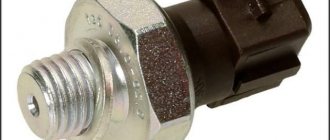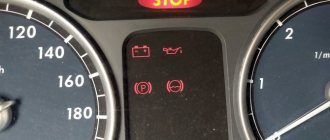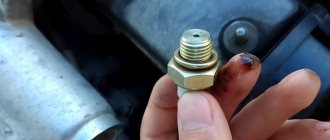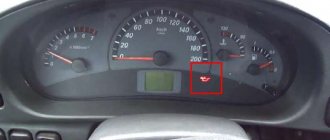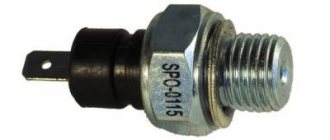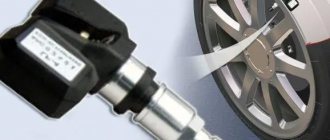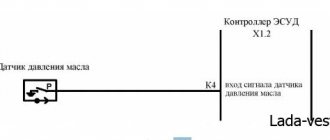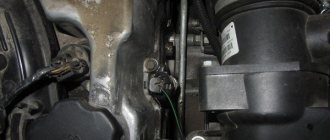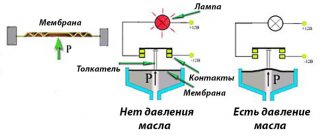Print this article Font size 16
From the very first to the most modern cars, lubricants are used. Without it, it is impossible to operate the machine, inside of which there is a huge number of rubbing parts. The model of the domestic manufacturer VAZ 2114 is no exception, because lubricating oil is necessarily present here.
The lubrication system must always be under the control of the driver in real time. To do this, the car design provides for the use of an oil level sensor.
With its help, the driver can quickly find out that the oil level has dropped to an unacceptably low level, and therefore appropriate action should be taken.
Appearance of the DUM
Sensor operating system
Lubrication in a car is used not only in the engine, but in many other units, but it is in the engine that even a short-term disruption in the system can cause irreversible consequences. Experienced motorists call this “engine knocking.” Therefore, it is very important to find out the reason for the alarm even with a short-term alarm, otherwise there is a possibility of facing expensive repairs. The operating principle of the oil level sensor is to measure current resistance in time. In working condition, the measuring part of the device is immersed in a liquid, in our case, oil. When the lubricant level decreases, the measuring part becomes dry and, therefore, all current resistance is lost. While being immersed in a liquid medium, it gives greater resistance at the exit.
It should be recalled that in addition to the oil level sensor (OLS), there is also an emergency oil pressure sensor (DAPM), but still these are completely different devices.
Triggering of the DUM may indicate the following:
- Insufficient lubrication in the engine. Check visually (with a probe).
- The measuring device itself does not function. Perhaps the DUM itself burned out, or the contacts oxidized.
Before replacing the oil level sensor on a VAZ 2114, it would be advisable to check its functionality.
How does he work
Lubrication is present in many systems and components of a machine, but for the engine it plays the most significant role. If she disappears even for a short period of time, it will instantly lead to serious problems.
The operating principle of this sensor is to timely measure current resistance. The oil measuring element is immersed in a liquid, that is, lubricating engine oil. When its level decreases, the measuring element dries out, so the current resistance disappears. The driver receives a signal and solves the problem of oil shortage or leakage.
Triggering of the DUM
If the oil sensor has tripped on your car, it could be due to one of two reasons. Let's look at them in our table.
Cause
What to do
Low lubricant level in the motor
It is necessary to check the level using a dipstick. The most visual and effective way to measure the actual oil level
The meter is out of order
In such a situation, there is a high probability that the DUM has burned out or its contacts have become unusable. To check you will have to dismantle
Do not rush to immediately change the sensor if you are not sure that it is the cause of the problem. To begin with, it is worth checking it in operation.
Verification method
Not everyone knows how to check the oil level sensor, however, this is a completely simple operation. For this job we will need:
- a set of keys;
- voltmeter;
- rags;
- inspection pit or overpass.
Pay attention to where the VAZ 2114 oil level sensor is located. This place is located near the oil filter. To get to it we proceed in the following sequence:
- We park the car on an overpass (or on a viewing hole).
- We dismantle the engine protection.
- We get to the DUM.
- We clean from dirt and dust.
- We start the car.
- Disconnect the wire connected to the block.
- Using a voltmeter, measure the voltage at the connection block and ground. A working measuring device should show a voltage of 12 V on the voltmeter.
How to change the oil level sensor on a VAZ 2114
If the specified voltage is not available, then do the following:
- check the functionality of the display unit;
- check the contact and the possibility of wire breaks in the circuit.
If the above actions do not have any result, then replacing the VAZ 2114 oil level sensor becomes the next step in troubleshooting.
conclusions
It will not be possible to detect a breakdown of the oil level sensor on a VAZ 2114 with a simple eye, and it will almost certainly be necessary to carry out an in-depth check using the described method to determine the causes of the malfunction. The driver does not have to carry out this procedure himself, because there are many car services that are ready to perform the necessary diagnostics and replace a damaged sensor.
Replacement
Replacing the DUM is not some difficult or complicated task. Any novice driver is quite capable of carrying out the replacement, and to make this work easier, we have prepared instructions. So let's get started:
- First, we place the car on an overpass or inspection hole.
- Turn off the ignition and remove the wire from the negative terminal of the battery.
- We dismantle the engine protection.
- Remove the wire tip from the DUM block (it is located near the oil filter).
- Using a rag, clean the upper part of the measuring device from dust and dirt.
- Take a 10mm socket wrench and unscrew the fastener.
- Gently rocking from side to side, we remove the part from its seat, trying not to damage the float.
- We take a new DUM and carry out the work in reverse order.
The structure of alerting the driver about the operation of the lubrication system also includes an emergency oil pressure sensor.
It also sometimes breaks down and requires replacement. It consists of a housing in which the measuring membrane is located, as well as a transmission mechanism. This membrane can bend and take one or another position. At the same time, it closes or opens the contacts. The easiest way to check the functionality of this device is to replace it with a spare one. If there is no spare, then check by connecting a pressure gauge. It is installed in place of the sensor and the engine is started. At idle, its readings should be at least 0.65 kg/cm2. If this is the case, then the pressure in the engine is normal, and the removed device is out of order and must be replaced.
This device cannot be repaired, since it is unprofitable, and the price of a new one is not so high.
Sometimes this trouble, when the red light with an oil can blinks, can happen on the road when there are no instruments at hand. In this case, you can use the so-called traditional method of checking DADM. To do this, you need to remove it and crank the starter (without starting the engine!). Oil should squirt out of the mounting hole. If this happens, then there is pressure in the engine and, at least, you can get to the garage, where in a calm atmosphere you can find out the cause of what happened.
It is very easy to replace this device. You need to remove the decorative trim from the car engine. Find the upper part of the measuring device and remove the boot from it, under which there is a power wire. Let's take it off too. After this, we unscrew the DADM from the engine block and install a new one in its place. Make sure there is a sealing washer under the head! We connect the wire, mount the decorative trim, start the engine and check the operation.
Even if the devices do not signal any troubles, make it a rule to regularly visually check the lubricant level in the engine (that is, with a dipstick). This is especially true before a long journey.
Elimination methods
Now you can go directly to the elimination methods. First, you need to figure out what tools you may need to complete the process: a 10mm wrench, a multimeter, a set of screwdrivers. Now that everything is collected, you can move directly to solving problems.
Low oil level on dipstick
The dipstick is used to measure the oil level in the engine.
Oil production and wear can affect its level, so it is worth checking this indicator regularly.
Also, the cause of oil loss in the engine may be a faulty gasket or a breakdown in the engine crankcase . In order to eliminate oil loss, it was necessary to eliminate the malfunctions that caused the effect, and then add oil to the required level.
To measure the oil level, there is a special tool called an oil dipstick. It is located on the front of the engine. The oil level in the engine should be midway between the minimum and maximum indicators. When the indicator drops below the MIN mark, the oil level indicator lights up on the dashboard.
Sensor malfunction
A sensor malfunction can also cause an oil level indicator to appear on the dashboard. To eliminate the malfunction, you need to check the sensor, and if it is faulty, replace the part.
Old and new oil level sensor The replacement process is quite simple and not complicated. Let's consider the issue in more detail. To complete the operation, you will need a key for 10. So, let’s proceed directly to the sequence of actions aimed at replacing the sensor:
- The car must be installed so that there is access from below. A viewing hole, a lift or an overpass is suitable for this.
- Disconnect the negative terminal on the battery.
Remove the negative terminal from the battery. - If there is, it is necessary to remove the lower engine protection.
Remove the engine crankcase protection. - We dismantle the pallet.
You must first drain the oil from the engine through the drain plug. We dismantle the pallet. - Disconnect the wire block from the sensor. We clean the engine oil level sensor from dirt. Disconnect the block from the wires.
- Using a 10mm wrench or socket, unscrew the oil level sensor.
- We install a new sensor and carry out the necessary assembly.
Contact circuit problem
Diagnostics of the fuel level sensor chip More than once, the cause may be a break in the wires or contact group that goes from the sensor to the electronic control unit. Based on the electrical diagram of the car, we find the corresponding wire that powers the meter. Next, we find exactly the same one in the ECU and call it.
If there is no contact, then a break has occurred in this area and should be repaired. We carry out the same procedure with the remaining wires.
Short circuit inside the instrument panel
More than once, a short circuit inside the dashboard board can be the cause of a light on the dashboard. This may be caused by corrosion damage or a short circuit inside the instrument panel. Thus, the solution to the problem may be to repair the board or replace the instrument cluster.
Checking the contacts of the dashboard board It is quite easy to determine the malfunction: you just have to disassemble the device and look at the contact connections. Also, to be completely sure, you can ring the contacts on the board and directly on the indicator lamp itself, using a tester.
Malfunctions in the VAZ-2114 ECU
The last possible option to look for a fault is the electronic control unit. Errors may occur here that will not only cause the oil level light to light up, but also cause other indicators to malfunction, such as the speedometer, turn signal, and others.
The method of troubleshooting is to connect a laptop or tablet to the “brains” of the car via an OBD cable and a standard test. If errors related to the oil level are detected in the ECU, they must be reset. The procedure for resetting all errors should be done for all indicators that have accumulated in the “brains”. After this, the problem should disappear; if not, then the fault must be looked for elsewhere.
OIL LEVEL CONTROL SENSOR
The electric oil level sensor on the VAZ-2114 allows you to control the amount of lubricating fluid in real time during vehicle operation. The signal from it is sent to the corresponding dashboard indicator, notifying the driver about the lack of oil level in the engine sump. Insufficient oil level in the car crankcase leads to engine failure and, as a consequence, to expensive and time-consuming repairs.
Therefore, it is necessary to ensure that there is always a sufficient amount of suitable engine oil in the engine. For VAZ-2114 its volume is approximately 4 liters. When replacing it, the volume of newly filled engine oil should not be less than the volume of drained liquid. Reaching the required level is determined using a measuring probe.
PRINCIPLE OF OPERATION OF DUM
The operating principle of the oil level sensor is to use the properties of a reed switch (reed switch is a sealed magnetically controlled contact) with make-open contacts. When the sensor is immersed in engine oil, its contacts are open and the indicator does not light up. If the level is insufficient (there is no oil between the contacts of the reed switch), the contacts close, thereby turning on the electrical circuit of the control light on the car’s dashboard.
Helpful advice. While trusting the readings of the electrical control sensor, it is still recommended to check the engine oil level daily using a dipstick.
If the indicator of its insufficiency lights up, it is necessary to verify the reliability of the DUM readings. A measuring probe is used for this.
HOW TO USE THE DIRECTOR
Checking the oil level using a dipstick is carried out as follows (the car must be horizontal):
- remove the dipstick from the tube located under the hood in the front part of the engine compartment, wipe it and find the marked max and min marks;
- install the probe back into the tube;
- After 2-3 minutes, we take out the dipstick again and see where the upper edge of the oil mark is located on it. If the mark is between the min/max marks, then the amount of lubricant in the engine is normal, but the performance of the sensor is in doubt and must be checked.
Oil dipstick
WHY DOES THE DOOM INDICATOR LIGHT UP?
If during a trip the oil level indicator suddenly lights up on the dashboard, you should immediately stop and find out the cause of this phenomenon. Of course, you shouldn’t panic because of this, as the reasons can be different:
- There is not enough fluid in the car crankcase - you need to add oil to the oil filler neck to the required level. The oil to be added must be of the same type as that previously added. Otherwise the engine will fail.
- The level sensor is faulty.
Attention: DUM cannot be repaired. If it breaks, it must be replaced with a new one.
The causes of failure of the DUM are classified as follows:
- Oxidation of contacts;
- Short circuit or break in the power supply circuits of the sensor and/or liquid level indicator;
- Reed switch burnt out.
Why does the indicator light up on the instrument panel?
While driving a car, the DUM indicator may light up. Novice drivers in such a situation often fall into unreasonable panic. This can be due to both trivial and serious reasons. In one case, cleaning the contacts will help, in another, replacing the sensor. The first step is to measure the level using a dipstick. It is enough to clean it thoroughly and find the max – min marks on the surface.
Place the device in the tube and remove it back after three minutes. If the upper point of contact of the oil layer fits into the interval between the two marks, there is sufficient oil. If, for example, the level is below the min mark, you should add fluid to the normal level. And only after this can you move on to the next stage - checking the functionality of the DUM.
HOW TO CHECK AND REPLACE SENSOR
Checking the oil level sensor for functionality is quite simple. Any car enthusiast can do this if he has:
- Inspection pit (overpass);
- Voltmeter;
- A set of wrenches.
The performance check begins with determining the location where the oil level sensor is located on the VAZ-2114. First of all you need:
- Place the car on the overpass;
- Remove the engine protection;
- Clean the area around the oil filter from dirt;
- Find DUM. It is located near the oil filter.
Location of the oil level sensor
Then you can start checking the DUM, for which:
- Start the car;
- Disconnect the wire connected to the sensor and use a voltmeter to measure the voltage at its contact. The voltmeter should show a voltage of 12 V;
- If there is no voltage on the block, you should:
- Check the presence of contact in the DUM connecting block.
- Make sure there are no breaks or short circuits in the electrical circuit from the block to the indicator on the dashboard.
- Having eliminated the malfunctions, again measure the voltage on the connecting wire block with a voltmeter. The voltmeter should show a voltage of 12 V.
If there is 12 V voltage on the block, but the system still does not work, then the DUM must be replaced.
Replacing the oil level sensor on a VAZ-2114 is carried out as follows:
- Drive the car onto the overpass;
- Turn off the ignition;
- Disconnect the battery from the on-board circuit;
- Remove the motor protection;
- Clean the DUM connection block from dirt;
- Disconnect the sensor from the electrical circuit;
- Using a 10" socket wrench, carefully unscrew and remove the DUM;
- While gently rocking, remove the sensor from the mounting hole;
- Take a working DUM and install it, performing the above operations in reverse order. You can purchase a new sensor at any auto parts store, at a car market or in online stores. You can also purchase a VAZ 2115 oil level sensor there. The estimated cost of the DUM is 280 rubles.
- Reinstall the motor protection;
- Connect the battery to the on-board power supply;
- Using a dipstick, check for the presence of lubricant and, if necessary, add to the required level;
- Start the car and make sure the sensor is working.
In this practical guide, we will tell you where the oil level sensor is located on a VAZ 2114. In addition, we will tell you how to check the oil level sensor, and also describe the process of replacing it.
CONDITION MEASUREMENT
The oil condition sensor allows for a more rational use of the coolant lubricant resource, since the replacement period is determined not only by the manufacturer’s mileage recommendations, but also by the actual chemical and physical composition of the engine oil.
The device of the condition and oil level sensor of the N57 engine from BMW.
The meter consists of two cylindrical capacitors (6). The outer and inner metal tubes are used as electrodes, between which there is a dielectric - oil. The operating principle is based on a change in the dielectric properties of the oil during aging, which affects the capacitance of the capacitors.
When the level drops, the capacitance of the upper capacitor (5) changes. The temperature is continuously measured using a platinum temperature sensor (9). The change in capacitive characteristics of the capacitors, as well as the signal from the temperature sensor, is converted into a digital signal and sent to the DME unit. Based on the received data, the DME unit calculates oil change intervals.
DEVICE OF FLOAT SYSTEMS
The operation of the sensor is based on the opening and closing of the connected electrical circuit when exposed to a magnetic field from a permanent magnet. Device:
- vertical guide (tube);
- float with magnets located inside;
- magnetically controlled contact - reed switch (liquid level sensors of this type are also called reed switches).
The location of the float on the vertical guide depends on the level - the higher it is, the farther the magnets are located from the reed switch. As the oil level in the engine drops, the float itself also drops. The approach of magnets to a normally open type reed switch provokes the closure of the contacts, due to which the low oil level sensor light on the dashboard lights up.
The reed switch uses elastic ferrimagnetic contacts, so when the liquid level rises and the influence of the magnetic field stops, the circuit opens.
Where is the oil level sensor located on the VAZ 2114?
The oil level sensor is located at the bottom of the cylinder block. To find it you need to inspect the area below the oil filter . The part to which the wire is connected is the DUM.
The VAZ 2114 is equipped with a mechanical type DUM. It is equipped with a floating float. When the oil level is sufficient, the float, made of lightweight material, is in the upper position. When the level decreases, the float lowers and closes the sensor contacts. This turns on the warning lamp located on the display unit of the on-board control system.
Why does the alarm sound?
The reasons why the VAZ 2114 oil pressure is on may be:
- Damage to the oil pressure sensor.
- A break in the wires connecting the pressure sensor to the electronic unit.
- Low oil level in the system.
- Oil pump failure.
- Oil filter clogged.
Of all the above reasons, the last two pose the greatest danger to the moving parts of the vehicle. If the DDM itself breaks down, the cause can be eliminated literally in a matter of minutes. In addition to the above malfunctions, in which the signal in the form of an oil can on the dashboard lights up constantly, there are situations when it lights up periodically, either lighting up or going out.
The reasons for this behavior of the indicator may be:
- clogged filter mesh on the oil intake of the pump, which leads to improper operation of the latter;
- oil filter clogged;
- low oil viscosity due to its wear (it was not replaced for a long time);
- low oil viscosity due to gasoline entering the crankcase;
- short circuit of the wires connecting the DDM with the indicator on the dashboard;
- wear of crankshaft bearings.
Consequences of untimely oil changes Elimination of these reasons will help to completely get rid of the blinking pressure sensor on the panel.
How to check DUM on a VAZ 2114?
There are two reasons why the low oil warning light in the engine lubrication system comes on:
- Insufficient amount of lubricant in the crankcase of the power unit. In this case, you must immediately add oil to the required level. Failure to comply with this rule may result in the fluid level falling below the oil receiver and pressurizing the oil pump will become impossible. As a result, lubrication of the rotating parts of the engine will cease, which will lead to their premature wear.
- Sensor failure. It should be replaced with a new part.
Determining the nature of the malfunction is quite simple. When the warning lamp for insufficient oil level in the system turns on, you must check the amount of lubricant with a metal level. It is installed at the front of the engine. The part bears marks for the minimum and maximum amount of fluid in the crankcase pan of the power unit.
A normal level of lubricant and at the same time a burning lamp on the instrument panel indicate a failure of the sensor. It will need to be replaced with a new part. If there is not enough oil, you need to add it to the required mark on the dipstick.
In some cases, the reason for replacing the sensor may be a violation of its tightness. A sign of product failure is the appearance of oil smudges at the junction of the metal part and the electrical insulator of the DUM.
Reasons for triggering the DUM
The presence of a lit LED does not always indicate insufficient oil level. The driver, who decided to check the condition of the lubricant because of the signal, suddenly discovers that the liquid resource does not yet need to be replaced. In such a situation, it is worth paying attention to the condition of the VAZ 2114 sensor itself and neighboring components for the following phenomena:
- Accumulation of oil deposits in the pan, causing the oil receiver mesh to become clogged.
- Damage to the wiring connecting the dashboard LED to the oil level sensor.
- The oil pump began to work intermittently or completely failed.
- A critical amount of dirt has accumulated in the oil filter.
- There was an oil leak caused by oxidation of the gasket.
It is important to understand that when the oil level sensor signal comes on, it is a good reason to stop using the car until the causes of the malfunction are eliminated. In this case, it will be justified to call a tow truck to deliver the car to the workshop. Attempts to start the engine in such conditions can lead to engine damage and even an emergency.
Part replacement
If this sensor fails, it must be replaced. This does not require the use of specialized equipment. The car owner can carry out repair work independently. The only condition is the presence of an inspection hole, overpass or lift. Replacement is carried out in the following sequence:
- Place the car on the inspection hole. Eliminate the possibility of spontaneous rolling of the vehicle.
- De-energize the electrical system. The negative terminal should be disconnected.
- Remove the engine protection located under the bottom in the front of the car.
- Disconnect the electrical connector plug connected to the sensor
- To prevent contamination from entering the oil pan, clean the outer surface of oil smudges, dust and abrasive particles.
- Using a 10mm wrench, unscrew the sensor mounting bolt. To speed up the process, you can use a ratchet head.
- Remove the part from the seat.
- Inspect the new oil level sensor for integrity of the O-ring. Products with damaged or missing seals should not be installed. This may result in lubricant leakage.
Installation and assembly are carried out in reverse order. After installation, you must start the engine and check the condition of the warning lamp. If the indicator continues to light when the DPM is known to be working and the amount of oil in the system is normal, this means that the electrical wiring should be checked.
There is no place in a modern engine where oil is not used to lubricate rubbing parts. Today, choosing oil is a much more important task than choosing a gas station. Therefore, a lack of oil is a much more fraught consequence than a lack of gasoline. The oil level in the engine crankcase is monitored by an oil level sensor. Its main and only task is to alert the driver about low oil level.
The operating principle of such devices is to measure the level of current resistance. Immersed in liquid, the sensor produces a higher output resistance than a dry sensor. By the way, it should be mentioned that the oil pressure sensor and the oil level sensor are completely different things. The oil level sensor on the VAZ is located next to the oil filter.
Thermal sensors
It is the thermal level gauge that is most often found in the design of modern car engines. At the heart of the sensor is a heating element. The control unit alternates heating phases, briefly warming up the element to a temperature higher than the actual temperature of the oil in the engine, and cooling. It is the duration of the period of reduction in the temperature of the heating element to the temperature of the engine oil in which it is immersed that allows us to calculate the actual level.
The operating principle of this type of level gauge is determined by the presence of an oil temperature sensor. This is exactly the design and operating principle of the G266 sensor, which is installed on many Volkswagen, Skoda, and Audi cars. Both elements are combined in the level sensor housing, which is located in the engine oil pan.
Electrothermal level gauges
Electrothermal oil level sensors can be called a subtype of thermal level gauges. The sensor is based on a heating element (wire) with a high temperature coefficient of resistance. The total resistance of the heating element depends on the heating temperature. Accordingly, the deeper the sensor is immersed in the cooling lubricant, the better the heat removal from the heating element and the lower its resistance. The oil level is calculated by the control unit based on the actual voltage value at the sensor terminals.
Ultrasonic meters
The operating principle is based on the use of ultrasound - sound vibrations, the frequency of which exceeds the frequency range accessible to human organs of perception. The degree of reflection of sound waves depends on the density of the material towards which the source of sound vibrations is directed. Since the densities of the air and engine oil differ, sound waves are reflected at the boundary of the oil level in the pan. The reflected vibrations are picked up by the receiver, and the time interval between the transmitted and reflected signal is used to calculate the engine oil level.
G266 sensor device used in the design of VAG-Group cars.
A PTC resistor is also included in the housing, which allows you to measure the oil temperature. In addition to the measuring element, the device includes an electronic measuring unit that processes ultrasonic signals and signals from a PTC resistor. From the digital logic module, signals converted into a language understandable for control units - a PWM signal - are sent through the engine ECU to the dashboard.
Advantages over thermal elements
- Low current consumption.
- Speed of signal transmission.
- Possibility of implementing a graphical indication of the actual oil level in the engine.
Measurement algorithms
Static control. The engine has been stopped for more than 60 seconds and the vehicle is stationary (the parking brake must be applied)
To level out the measurement error, the possible inclined position of the car body is taken into account. So that the owner does not wait for data after turning on the ignition, the level is measured immediately after opening the driver's door. Dynamic level control
Activated when the vehicle is in motion. This takes into account: crankshaft speed, longitudinal and lateral acceleration, engine temperature, and the position of the hood limit switch. In this case, the movement cycle since the last activation of the hood must be more than 50 km.
The role of the hood switch
VAG in VW, Audi, Seat, Skoda cars uses a rather interesting scheme for connecting the engine oil level sensor. If the low level indicator lights up, then 2 conditions must be met for it to go out:
- activation of the hood switch (it is logical that without opening the hood it is impossible to add oil);
- level replenished.
If, after the low level light came on, you opened the hood but did not make up for the deficiency, the indication will go out and light up again only after 100 km. If the amount of coolant reaches a critical level, the low oil pressure light on the instrument panel will light up.
How to check the oil level sensor?
- We drive into the inspection hole.
- We remove the protection.
- We find the sensor.
- Turn on the ignition.
- Disconnect the connection wire to the sensor.
- We use a voltmeter to check the voltage between the connecting block and ground. A working sensor should show a voltage of around 12V on the voltmeter.
If there is no voltage, the following malfunctions are possible:
- poor contact or broken wire in the sensor circuit;
- The display unit is faulty.
Replacing the oil level sensor
Replacing the oil level sensor is not an extremely labor-intensive process.
- First of all, we drive the car onto a viewing hole or overpass.
- Turn off the ignition and disconnect the engine ground.
- We remove the pallet.
- We find the sensor next to the oil filter and disconnect the wire tip from the oil level sensor.
- Using a 10mm socket wrench, unscrew the sensor mount, then remove it.
- We take a new sensor and install it in the reverse order.
One of the parameters of engine operation is oil pressure. To ensure uninterrupted and high-quality functionality of the power unit, each driver must constantly monitor the maintenance of the required oil level in the engine. If the oil pressure light comes on on the dashboard of a VAZ 2114/2115, you must immediately take some action. The indicator will light up in cases where there are certain problems with the oil pressure in the engine unit system.
A little about the consequences
Consider yourself very lucky if the red light is on and you continue to drive without knocking or jamming. This means that only the VAZ 2114 oil sensor has failed. But it is not always possible to get by with little damage. 10-20 seconds of operation of the power unit without lubrication is enough for the crankshaft to rotate the Babbitt liners and jam. In this situation, you will face expensive repairs, which involve replacing the plain bearings and grinding the crankshaft bearings and connecting rod journals.
We should not forget about the piston group. If oil stops splashing onto the cylinder walls, the aluminum piston quickly heats up, causing it to increase in size. The result is deep scratches on the cylinder walls, wire-like rings, plus unusable pistons. Insufficient oil pressure, as indicated by a red light, can easily lead to a major engine overhaul.
Many motorists have encountered the fact that the low engine oil level indicator lights up on the instrument panel of a VAZ-2114. This may be due to several reasons. But the main thing is low oil level. Although, the fault may be hidden elsewhere. Let's look at the reasons why the oil level light comes on, as well as methods for solving the problem.
Why does the oil pressure light come on in the VAZ 2114/2115
There are several likely reasons why this car light suddenly comes on. And only based on an accurate determination of the cause can the necessary actions be taken to eliminate the malfunction.
The indicator may light up in two cases:
at engine idle speed;
when the car is moving.
Each of these cases has its own causes of malfunctions.
The indicator in the form of an oil can lights up in situations where there is any problem with the oil pressure
The light came on at idle
The oil pressure light may come on (or blink) at idle, and if you press the gas pedal, the icon will immediately go out. In this case, the most likely causes of malfunctions are the following:
the crankshaft liners are worn out: the oil pressure will drop due to the fact that the gap between the thinned liner and the car’s connecting rod has increased;
the oil receiver mesh is severely clogged: one of the most common reasons why a light bulb suddenly lights up. Various types of sediment are gradually deposited on the surface of the engine sump. At the moment when there are too many deposits, the pump can no longer supply enough oil to operate the engine;
wear or any problems in the oil pump: another probable reason why the indicator may light up on a VAZ 2114/2115. Due to a breakdown of the pump itself or any part of it, oil does not enter the engine in the required quantity;
the sensor is faulty: it is quite possible that the oil level and the engine itself fully meet their basic characteristics, and the problem lies in the sensor;
the wiring is shorted: problems in the car’s electronic system can also cause the engine oil supply system to not operate correctly.
The oil can indicator light came on while driving.
In cases where the oil pressure light suddenly comes on while the car is moving, it is advisable to stop immediately. Probably the following failure or breakdown occurred:
the oil level in the engine unit is below the Min mark;
the oil filter could be clogged - this leads to the fact that the pressure invariably decreases;
it's time to change the oil - in cases where the car owner does not replace the substance in the engine for a long time, it loses its working properties.
Diagnostics
Well, it’s one thing to talk about it, another thing when there are already problems. But what should you do if the oil pressure light comes on while driving?
The logical solution would be to get out of traffic, stop and visually assess the amount of oil in the engine yourself.
There is a special dipstick for this, which you can find near the oil filler neck.
If you are not mistaken, and there really is not enough oil, you need to add it. You must understand that the indicator begins to signal a problem when you still have some room to maneuver.
Most likely, if you are not on the highway between cities, then you should be able to get home or to the nearest service station without any problems.
- How to properly grind in valves at home: tips for running in engine valves (120 photos + video)
- The procedure for adjusting valves with your own hands - tips and recommendations for adjusting valve clearances (90 photos)
- Do-it-yourself adjustment of vase valves - a step-by-step master class on how to quickly and easily adjust classic valves (145 photos and videos)
In addition, if your car is still under warranty, then purely under the warranty agreement you should not interfere with the car yourself or by using the services of a service station that is not properly certified.
True, this may not apply if you simply need to change the engine oil, but this greatly depends on the manufacturer and dealer from whom you purchased the vehicle.
Over the past couple of years, situations have become more and more common when similar conditions were prescribed in the warranty agreement, and large companies were involved in this, which is the most unpleasant thing.
Without a guarantee, you should always take the time to check the oil, and only if it is not enough, add the required amount or completely replace it.
- Do-it-yourself pump replacement: signs of breakdown, replacement tips and features of installing a new unit (115 photos)
- Replacing crankshaft oil seals with your own hands: step-by-step instructions on how to replace the front and rear oil seals (90 photos + video)
- How to replace valve guides - a step-by-step master class on how to replace the guides correctly with your own hands (95 photos)
If, even after changing the oil, the pressure light comes on, you need to carry out a more detailed inspection of the car, but whether you do it yourself or not is up to you to decide.
What to do when the oil pressure light is on in a VAZ 2114/2115 car
Depending on the cause of the malfunction, the driver’s actions will differ when this indicator lights up.
If the oil pressure light in a VAZ 2114/2115 lights up when the engine is fully warmed up and the car is stopped (idling), the following actions will be required:
If the cause of the malfunction is wear of the crankshaft liner, serious car repairs will be required. Depending on the general condition of the machine, you may need either a complete replacement of the crankshaft, or large-scale repair of the shaft and replacement of the bearings with new ones. It is advisable to contact a car repair shop.
In the event that the oil pressure has dropped due to debris and deposits in the receiver grid, each driver can independently eliminate the cause of such a malfunction. It is necessary to clean the mesh and also remove accumulated debris and adhered dirt from the tray. It is also recommended to flush the engine with special flushing oils at the next oil change.
A faulty oil pump can only be removed in one way - by replacing the pump itself. If the car owner does not understand the design features of the VAZ 2114/2115, then it is also better to seek help from specialists.
If the oil pressure sensor is faulty, it is also recommended to replace it. It should be noted that recently, more and more often, owners of domestic cars are diagnosing problems with pressure sensors. This is explained by the fact that auto shops and car markets often sell spare parts of dubious quality.
It is better to entrust the search for a short circuit in the wiring to an auto electrician.
Video: the oil pressure light came on at idle, what to do
However, what should be done if the oil pressure light comes on while driving? The first step is to stop on the side of the road or in any convenient place where the car will not become a hindrance to other road users:
After stopping, it is advisable to check the oil level in the engine unit. It is quite possible that its level is below the Min mark, which is why the indicator in the cabin came on. It is necessary to add working fluid and continue driving. If the light comes on due to lack of oil, then the problem is considered solved.
The light may come on immediately after replacing the oil with a new one. This is a completely normal situation. You must wait 20 seconds - the indicator should go out.
If the indicator does not go out, the cause of the malfunction lies in a poor-quality oil filter. We'll have to replace it.
Video: the oil pressure light came on while driving, what to do
All other cases (failure of the oil pressure sensor, short circuit, wear of parts) require a specialist. It is necessary to deliver the car to a service station.
In case of a more serious breakdown, you cannot do without special tools and equipment. If you have checked the oil level, are sure that a high-quality filter is installed, and the pump is in fully operational condition, it is almost impossible to independently identify other causes of malfunctions. Therefore, it will be necessary to transport the car by tow truck or tug to a service station in order to identify breakdowns of crankshaft parts and carry out professional repair work.
Constantly monitoring the condition of your vehicle is the task of every driver. This task is especially relevant for owners of domestic cars. Moreover, maintaining the oil level at the required level is the main way to care for the engine unit and maintain the performance of the entire machine.
The oil level sensor (also known as OLS) in any car performs the most important function - the function of monitoring and protecting the engine. If this sensor is faulty, there is a high probability of “dry” engine operation, which, as is known, is fraught with at least an increase in fuel consumption and, at a maximum, breakdowns in the very heart of your car.
In the VAZ 2115, the oil level sensor is located next to the engine, in close proximity to the oil filter. The indicator, in turn, is displayed on the dashboard of the car. When the oil level drops to a critical level, the indicator lights up, and the car owner needs to add oil to the engine as quickly as possible. In any case, this is when the sensor is working. However, in addition to a decrease in the oil level, a burning light on the dashboard may also indicate a malfunction of the sensor itself - for example, caused by oxidation of the contacts or their short circuit.
You can check how efficient the VAZ 21115 oil level sensor is, either at a service station or completely independently. This does not require any special tools - just check the oil level using the dipstick (under the hood). You can conduct (also independently) a more thorough check.
The tools required for diagnostics are minimal - a voltmeter, a set of screwdrivers.
What you need to know about DDM?
So, first, let's figure out what the VAZ 2114 oil pressure sensor is, what functions it performs, where it is located and how to check it. Let's start with the purpose and installation location.
Purpose and location
The oil pressure controller on a VAZ is one of the main components of the vehicle condition monitoring system. This device allows you to timely determine a critically low pressure level in the engine lubrication system. Accordingly, thanks to this device, you can not only eliminate malfunctions that have arisen in the system, but also get rid of the reasons why this happened.
So where is the oil pressure sensor in the Four, you ask. As you can see from the photo, the device is located in the engine compartment, in particular, in the cylinder head socket, under the black engine trim.
Design features and operating principle
It should be noted that, regardless of the vehicle model where the DDM is used, all controllers are characterized by an almost identical design.
The main components of the device:
- sealed magnetically controlled contact - reed switch;
- special membrane;
- device body;
- bimetallic plate (video author - Kirill Zbruenko).
As for the principle of operation, this is also not a particularly difficult question. At the moment when the motorist activates the ignition, there will be no oil in the system, while at the magnetically controlled contact the contact elements themselves will be closed. Naturally, the electrical circuit itself will also be closed, so the corresponding engine fluid pressure indicator lights up on the dashboard - this indicates that the circuit is fully operational.
When the driver starts to start the power unit, the level of motor fluid in the oil system rises, which ultimately leads to an increase in the pressure parameter at the DDM. More precisely, we are talking directly about the membrane installed inside it. As a result of this, deformation of the membrane element occurs, which helps to open the contacts on the circuit; accordingly, because of this, the indicator on the control panel stops lighting. The deformation of the membrane contributes to the impact on the device plate, and its spiral, in turn, transmits data on the pressure indicator to the controller itself.
As you can see, in general there is nothing complicated about this issue. If for some reason the pressure in the oil system begins to decrease, this again leads to a closed circuit. Accordingly, if there is an arrow, it will drop to zero, and a light indicator will again appear on the control panel, which indicates the need to diagnose the controller (the author of the video is the Auto Repair and Tuning channel).
Diagnostic features
As you already understood, if the oil indicator light does not disappear on the dashboard after starting the engine, this indicates that the emergency oil pressure sensor should be checked. Or rather, first of all, you should diagnose the level of consumables in the power unit. If the working fluid level corresponds to the norm, that is, it is between the MIN and MAX marks, it is necessary to start checking the controller itself.
As for diagnostics specifically, the first thing you can do is perform a visual check of the device. Inspect the controller housing to see if there is any damage, traces of engine fluid leaks, etc. If oil traces are visible on the regulator, then you need to make sure that the problem lies in the sensor; to do this, carefully inspect the power unit itself. If the consumable material comes out somewhere from under the regulator, then most likely the reason lies in the wear of the rubber seal, which can be replaced. If oil leaks from under the connector where the terminal is installed, then the controller itself will need to be changed.
- Diagnostics using a voltmeter will allow you to more accurately determine the malfunction of the device:
- First you need to drive the car onto an overpass or pit.
- Unscrew the bolts that secure the power unit protection, and then remove it.
- When you find the DDM itself, the car engine will need to be started.
- Having done this, the power cord from the device must be disconnected. Then take a tester and diagnose the voltage level between the ground and the connecting plug. If the device is working, then the voltage indicator on the display will be 12 volts (video author - Vyacheslav Kravchenko).
If the voltage is lower, then most likely the reason lies in the failure of the display unit or poor contact in the electrical circuit of the DDP. If the contact is normal, then there is a possibility that a wire break has occurred in the circuit.
Diagnostics of the operation of the VAZ 21115 oil level sensor.
It is most convenient to carry out work in a pit, or using a lift.
- We place the car in the pit, taking all necessary measures to ensure safety (at a minimum, the car remains on the handbrake).
- We remove the protection to gain direct access to the oil level sensor.
- With the ignition on, turn off the power to the sensor. Now you can measure the voltage between ground and block. A working sensor will show 12V, a faulty sensor will show no voltage.
If there is no voltage, you can go in several ways. Firstly, prevent oxidation of the contacts (it is enough to clean them). Secondly, check the wire for breaks. If you did not find a break, and cleaning the contacts did not lead to the desired result, most likely the reason is in the sensor itself and it will have to be replaced.
Replacing the oil level sensor VAZ 21115
The tools required to carry out the entire operation are minimal - a 10 key is enough. However, auto mechanics claim that the “straight hands” function is also necessary).
Replacement of the DUM is carried out in a pit, overpass or using a lift.
- Getting started is similar to the above recommendations for diagnosing the sensor. The car is securely secured on a lift, pit or overpass, after which (with the ignition off!) we turn off the engine mass.
- We remove the pan, turn off the power from the DUM and remove it using a 10 key.
- We install a new oil level sensor VAZ 21115, then in the reverse order we restore the integrity and performance of our car.
To post a reply you must log in or register.
Repair and complete replacement of the oil sensor with your own hands or at a car dealership
Replacing the sensor yourself is quite possible and will save on the work of a car service specialist.
In general, the oil sensor is located to the left of the engine in foreign cars or directly in the crankcase, like in domestic cars, although there are more complex designs.
To replace the sensor yourself, you should place the car in an inspection hole and turn off the ignition and engine ground. Then you need to remove the pan and find the sensor to disconnect all the wires from it. Using a socket wrench “10”, the device mount is unscrewed. After this, it can be removed and replaced with a new one by performing all the same steps in reverse order.
Posts 8
1 Topic by dorik 2012-11-25 22:10:25
- dorik
- New member
- Inactive
- Registration: 2012-11-25
- Messages: 18 Thanks : 3
Topic: Resolved: the engine crankcase low oil level light is on
The level on the dipstick is normal, but the lamp is still on.. can you tell me about this problem??
2 Reply from aleks-nk 2012-11-26 03:51:25
- aleks-nk
- Participant
- Inactive
- From: Novokuznetsk
- Registration: 2012-02-25
- Messages: 136 Thanks : 29
- Car: VAZ 21102 1.5 8kl 2004 Niagara
Re: Resolved: the engine crankcase low oil level light is on
Either the oil sensor needs to be changed or the wiring is shorted. or more seriously, the oil pump is not pumping
3 Reply from Admin 2012-11-26 04:17:33
- Admin
- Administrator
- Inactive
- Registration: 2012-02-20
- Messages: 3,257 Thanks : 624
Re: Resolved: the engine crankcase low oil level light is on
dorik , check the oil pressure sensor itself, if it doesn’t, then look further at the oil pressure sensor category, now there is only one article, but in it you will find advice on how to check why the oiler caught fire. By the way, in a few days a couple more articles will appear in this category
4 Reply from iliaBkmz 2012-11-26 09:29:33
- iliaBkmz
- Forum legend
- Inactive
- Registration: 2012-11-12
- Messages: 2,041 Thanks : 584
- Car: outlander and 2104
Re: Resolved: the engine crankcase low oil level light is on
Remove the wire from the sensor and check whether the light goes out; if it goes out, then the sensor is not working. The float on the sensor could be stuck or simply broken. Replace it in this case - work for 10 minutes.
5 Reply from dorik 2012-11-26 11:32:39
- dorik
- New member
- Inactive
- Registration: 2012-11-25
- Messages: 18 Thanks : 3
Re: Resolved: the engine crankcase low oil level light is on
Guys...it's not the oil pressure light that's on...it's the low oil level light in the engine crankcase. Today I cleaned the contact.. changed the sensor - it’s still on. Maybe someone has encountered such a problem. the level is also normal
6 Reply from Admin 2012-11-26 12:18:26
- Admin
- Administrator
- Inactive
- Registration: 2012-02-20
- Messages: 3,257 Thanks : 624
Re: Resolved: the engine crankcase low oil level light is on
dorik , it’s clear that you are talking about the low oil level indicator on the BI BSK. the light comes on when there is ground on pin 9, check where it comes from there
7 Reply from iliaBkmz 2012-11-26 13:22:06
- iliaBkmz
- Forum legend
- Inactive
- Registration: 2012-11-12
- Messages: 2,041 Thanks : 584
- Car: outlander and 2104
Re: Resolved: the engine crankcase low oil level light is on
I wrote to you about him. Admin - I wrote it correctly - if the mass came from the sensor, the lamp came on. It can be checked simply: 1. Remove the wire from the sensor - see if the light goes out - if it doesn’t go out, then the sensor has nothing to do with it at all. 2. Next, we remove the BSK block and check whether ground has “arrived” at the contact - according to the diagram above - Admin We do not put the wire on the sensor 3. If there is ground on the wire, it means that somewhere it is shorted to ground and you need to find it using tourniquets. 4. If there is no ground in the wire, then put the block back on and check on the connected connector on the reverse side - perhaps it is shorting through the block itself. That's all science is - you just have to look.
8 Reply from dorik 2012-11-26 22:54:46
- dorik
- New member
- Inactive
- Registration: 2012-11-25
- Messages: 18 Thanks : 3
Re: Resolved: the engine crankcase low oil level light is on
everything is fine, thank you all.. it turned out to be very simple. the wire that goes to the sensor simply shorted to ground... due to the fact that I was changing the thermostat, and when I tightened the timing belt guard, I didn’t notice how the wire got between it and the engine.
Oil level sensor (OLS) VAZ 2115 - designed to monitor the oil level in the engine, it is located near the oil filter, which, as you know, is located in the engine crankcase. The signal from the sensor is sent to the corresponding indicator on the dashboard.
The main task of this sensor is to monitor the oil level and timely send a signal to the indicator light if it drops to a critical level. The principle of operation is based on measuring current resistance; if there is enough oil, the sensor is immersed in liquid - at its output the resistance will be higher than the resistance on a dry sensor at a low oil level. Some motorists confuse the oil level sensor with the oil pressure sensor, which I have written about several times in previous articles. These are different sensors, although they do have a lot in common, well, first of all, they are both sensors, both work with oil and are indicators of a malfunction in the oil system.
The malfunction of this sensor is dangerous due to engine oil starvation, that is, when the engine runs without oil, roughly speaking, “dry.”
How to check the oil level sensor VAZ 2115
To confirm or refute the assumption that the DUM is faulty, you can simply check the oil level in the engine; to do this, just open the hood and remove the dipstick. A more precise check is performed as follows.
- We drive into the pit and remove the protection.
- We get to the sensor.
- Turn on the ignition.
- Disconnect the sensor's power cable.
- Using a voltmeter, check the voltage between the block and ground; the voltmeter will show voltage on the working sensor
12th century If there is no voltage, there may be a problem with the contact, or a broken wire; there may also be problems with the display unit itself. If none of the above is confirmed, the sensor may have died, in which case you should buy a new VAZ 2115 oil level sensor and replace the faulty one with it.
